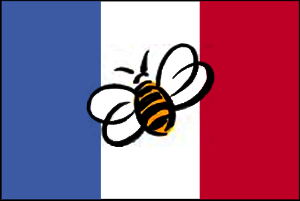01
Jul
France on Track to Ban All Neonicotinoid Pesticides by 2018
(Beyond Pesticides July 1, 2016) Lawmakers in France approved plans to totally ban neonicotinoid pesticides by 2018, based on their link to declining populations of pollinators, specifically bees. This new restriction would go above and beyond current European Union (EU) restrictions on neonicotinoids, which limit the use of neonicotinoids, but do not ban them. The outright ban on neonicotinoid pesticides in France was adopted by a narrow majority of the country’s National Assembly, as part of a bill on biodiversity. While the bill must still gain the approval of the French Senate, which rejected it in a previous reading, passage by the Assembly is significant, as France becomes the first country to join state and local movements to eliminate the use of these toxic chemicals.
Neonicotinoids have been found by a growing body of scientific literature to be linked to honey bee and other pollinator declines. In light of these findings, in 2013 the European Commission voted to suspend the use of neonicotinoid pesticides for two years. The ban came several months a fter the European Food Safety Authority (EFSA) released a report identifying “high acute risk” to honey bees from uses of certain neonicotinoid chemicals. Along with recent reports and studies highlighting the role these chemicals play in pollinator decline, there is evidence that the use of neonicotinoids are not efficacious or even necessary in agriculture. In August of 2015, figures for the first oilseed rape harvest since the European-wide ban was introduced show that the yield so far is higher than the average for the previous decade, when the chemicals were used on the majority of oilseed rape grown in the UK. In 2014, the U.S. Environmental Protection Agency (EPA) released a report concluding that soybean seed treatments with neonicotinoid insecticides provide little or no overall benefits in controlling insects or improving yield or quality in soybean production. The seed treatment market has more than tripled in size between 1990 and 2005, with neonicotinoids making up 77 percent of the market share.
fter the European Food Safety Authority (EFSA) released a report identifying “high acute risk” to honey bees from uses of certain neonicotinoid chemicals. Along with recent reports and studies highlighting the role these chemicals play in pollinator decline, there is evidence that the use of neonicotinoids are not efficacious or even necessary in agriculture. In August of 2015, figures for the first oilseed rape harvest since the European-wide ban was introduced show that the yield so far is higher than the average for the previous decade, when the chemicals were used on the majority of oilseed rape grown in the UK. In 2014, the U.S. Environmental Protection Agency (EPA) released a report concluding that soybean seed treatments with neonicotinoid insecticides provide little or no overall benefits in controlling insects or improving yield or quality in soybean production. The seed treatment market has more than tripled in size between 1990 and 2005, with neonicotinoids making up 77 percent of the market share.
While France has established itself a leader in protecting pollinators, other European countries have not followed suit. The United Kingdom (UK) has raised opposition to EU efforts to limit the use of neonicotinoids at every turn. It opposed the two year moratorium on neonicotinoid use, citing a study published in 2013 by Britain’s Food and Environment Research Agency (FERA), which found “no clear consistent relationship” between exposure to neonicotinoids and the growth of bee colonies and the number of queens they produce. However, a new analysis of the FERA data was conducted and it was concluded that the data clearly showed substantial negative effects of neonicotinoids on the performance of colonies. As a result, Britain was required to comply with the ban under EU rules, though it did not stop FERA from approving an emergency application for the use of neonicotinoids in 2015. With UK’s recent decision to leave the EU, it is uncertain whether it would continue the EU-wide restrictions currently in place on neonicotinoid pesticides.
France’s environment minister, Segolene Royal, is in favor of the proposed neonicotinoid ban, though he acknowledges that getting it past the Senate remains a significant obstacle. He is also in favor of phasing out glyphosate, the main ingredient in Roundup. He said in a statement: “This decision will prepare us for the future and protect bees and the role they play. Research and development of substitute products has to accelerate.”
Earlier this month, a proposal for a temporary ”˜technical extension’ of the EU approval of the herbicide glyphosate failed to secure the support of a majority of EU governments at a meeting of the EU standing committee on plants, animals, food and feed, putting the chemical’s chance for re-approval up in the air. Glyphosate has been subject to widespread public scrutiny since the International Agency for Research on Cancer (IARC) classified it as a 2A probable carcinogen based on animal studies.
In the U.S., the struggle to address the pollinator crisis continues to face obstacles, even in face of a growing number of Americans who believe bee declines are critical and linked to pesticide use. Last week, advocates delivered over four million signatures to the EPA calling for decisive action on the rampant use of neonicotinoids and similar systemic insecticides, which scientists say are a driving factor in declining bee populations. See more information on the serious decline of honey and other pollinators at www.beeprotective.org.
All unattributed positions are those of Beyond Pesticides
Source: Natural Society










